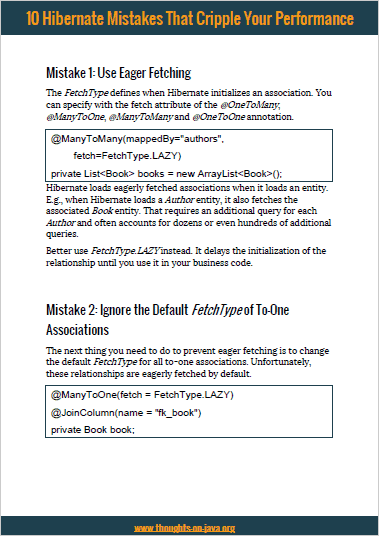Hibernate Tips: How to escape table and column names
Take your skills to the next level!
The Persistence Hub is the place to be for every Java developer. It gives you access to all my premium video courses, monthly Java Persistence News, monthly coding problems, and regular expert sessions.
Hibernate Tips is a series of posts in which I describe a quick and easy solution for common Hibernate questions. If you have a question for a future Hibernate Tip, please leave a comment below.
Question:
One of my entities represents an order which a customer placed in my online store. I would like to call that entity Order, but Hibernate generates SQL statements containing syntax errors and throws SQLGrammarExceptions. How can I escape the table name to avoid the syntax errors?
Solution:
By default, Hibernate maps an entity to a database table with the same name. So, in this case, Hibernate tries to map the Order entity to the Order table. But Order is a reserved word in SQL and can’t be used as a database identifier. You either need to choose a different table name or use a delimited identifier.
The definition of a delimited identifier is pretty simple. It’s defined in section 2.13 of the JPA specification. You just need to set the table name with a @Table annotation and enclose it in double quotes.
@Entity
@Table(name = "\"Order\"")
public class Order { ... }
You can not only use this approach with the @Table annotation. It’s also supported by all other JPA annotations that allow you to define a database identifier. These are:
- @EntityResult
- @FieldResult
- @ColumnResult
- @CollectionTable
- @Column
- @DiscriminatorColumn
- @ForeignKey
- @Index
- @JoinColumn
- @JoinTable
- @MapKeyColumn
- @MapKeyJoinColumn
- @NamedStoredProcedureQuery
- @OrderColumn
- @PrimaryKeyJoinColumn
- @SecondaryTable
- @SequenceGenerator
- @StoredProcedureParameter
- @Table
- @TableGenerator
- @UniqueConstraint
When you specify the table name like this, Hibernate and all other JPA implementations will use the defined delimited identifier in all generated SQL statements.
17:13:21,070 DEBUG [org.hibernate.SQL] - insert into "Order" (orderNumber, version, id) values (?, ?, ?)
Learn more:
If you like to learn more about JPA’s @Table annotation, you should take a look at this Hibernate Tip: How to define schema and table names.
Hibernate Tips Book

Get more recipes like this one in my new book Hibernate Tips: More than 70 solutions to common Hibernate problems.
It gives you more than 70 ready-to-use recipes for topics like basic and advanced mappings, logging, Java 8 support, caching, and statically and dynamically defined queries.

